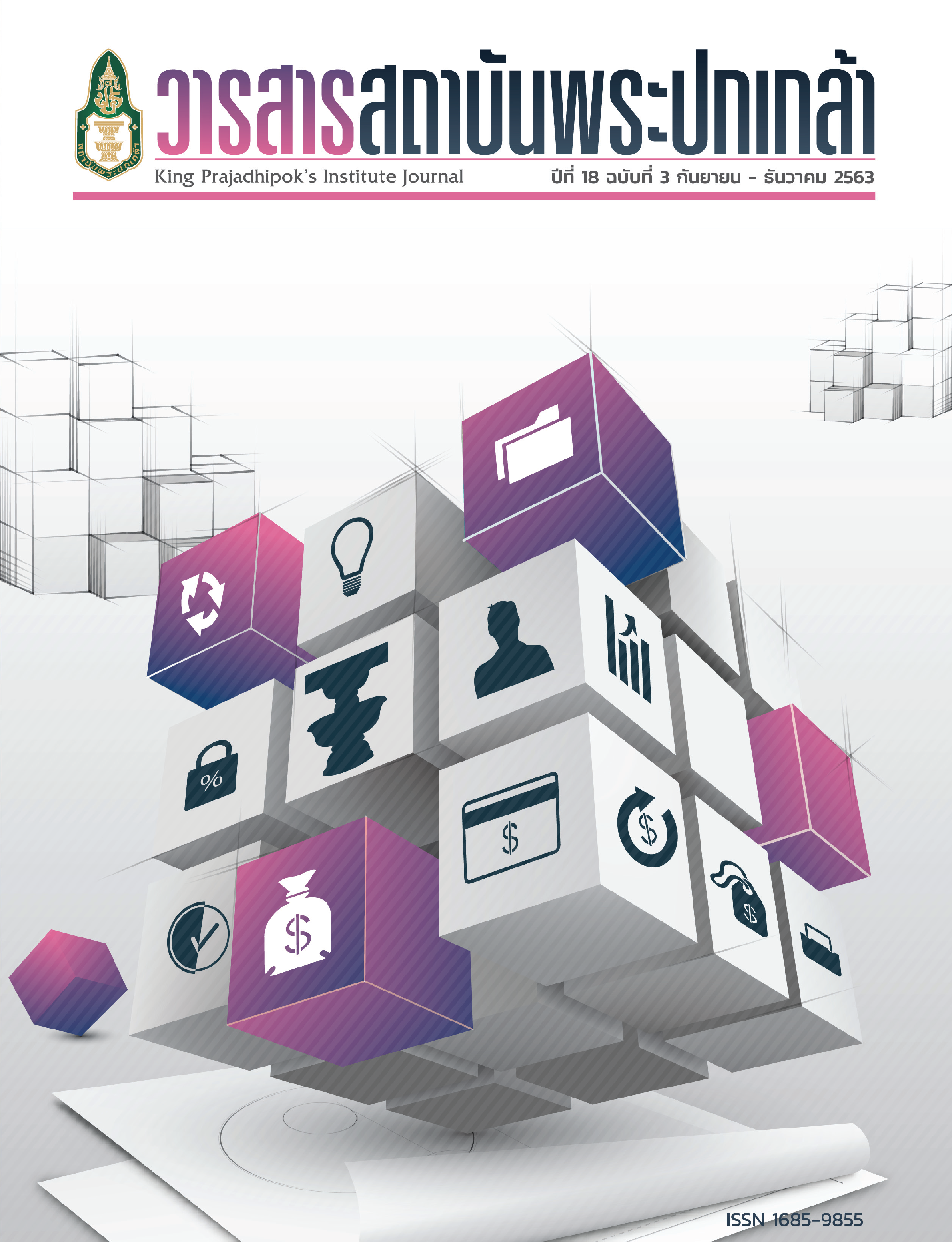Instilling Values that Characterize Students of King Prajadhipok’s Institute
Main Article Content
Abstract
This article is derived from research entitled “Developing Activities and Learning Manuals Based on the Principle of Wise Leadership to Build KPI DNA Values among Students of King Prajadhipok’s Institute”. This article has two objectives: to analyze the values and KPI DNA identities desired of students at King Prajadhipok’s Institute, and to develop learning activities to instill those values and KPI DNA identities. The results of the study are as follow. 1) Students of King Prajadhipok’s institute should uphold shared values which are a shared identity among the students. The shared identity consists of: “Knowledge-K”—the value that relates to the use of knowledge, information and facts for everyday decision-making; “Public mind-P”—the value that relates to public consciousness and the determination to work for the overall society; and “Integrity-I”, the value that strengthens the will-power to only act with virtuousness. 2) To encourage the students to uphold these values, a set of learning activities must be designed to fit the character of students, who are mature, experienced, and reliable. Those activities are “the Perspective”, “the Idol”, and “the Reflection Link”. The activities aim to promote the positive character of all students and broaden their worldview as well as perspective. The activities will help students to review and reflect on themselves to their classmates to commit themselves to the public interest.
Article Details
@ 2020 King Prajadhipok's Institute The Government Complex Commemorating All Right Reserved.
References
สุดารัตน์ ตันติวิวัทน์. (2560). จิตวิทยาเชิงบวก: แนวคิด การพัฒนา และความท้าทายในอนาคต. วารสารพฤติกรรมศาสตร์เพื่อการพัฒนา, 9(1), 277-290.
Jan, Mingfong & Gaydos, Mathew. (2016). What is Game-Based Learning? Past Present and Future. Educational Technology, 56(3), 6-11.
Kayes, Anna & Kayes, Christopher. (2011). The Learning Advantage: Six Practices of Learning-Directed Leadership. 69-91th ed. New York: Palgrave Macmillan.
Knowles, M. S.. (1950). Informal Adult Education. New York: Association Press.
Kolb, David A. (1984). Experiential Learning: Experience as the Source of Learning and Development. Englewood Cliffs, N.J: Prentice Hall.
Lindeman, Eduard Christian. (1926). The Meaning of Adult Education. New York: New Republic, Incorporated.
Mezirow, Jack. (1977). Perspective Transformation. Studies in Adult Education, 9(2), 153-164.
Lavigne, Nancy & Mouza, Chrystalla, Eds. (2012). Emerging Technolgies for the Classroom: A Learning Sciences Perspective. New York: Springer Science & Business Media.
Nonaka, Ikujiro, & Takeuchi, Hirotaka. (2011). The Wise Leader. Harvard Business Review, 89(5),58-67.
Ross-Gordon, Jovita M., Rose, Amy D, & Kasworm, Carole E. (2017). Foundation of Adult and Continuing Education. San Francisco: John Wiley & Sons, Inc.
Seligman, Martin E.P. (2004). Authentic Happiness: Using the New Positive Psychology to Realize Your Potential for Lasting Fulfillment. UK: Hachette.
Seligman, Martin E. P. (2011). Flourish: A Visionary New Understanding of Happiness and Well-being. New York: Simon and Schuster.
Takeuchi, Hirotaka. (2013). Wise Leadership and Wise Capitalism. Kindai Management Review, 1, 17-27.


